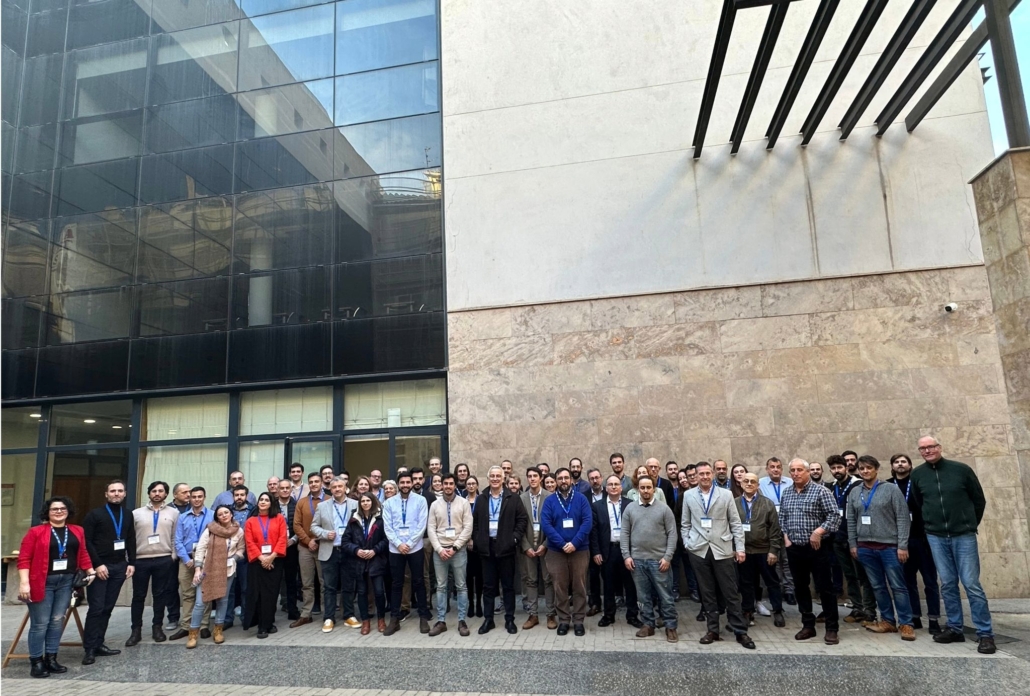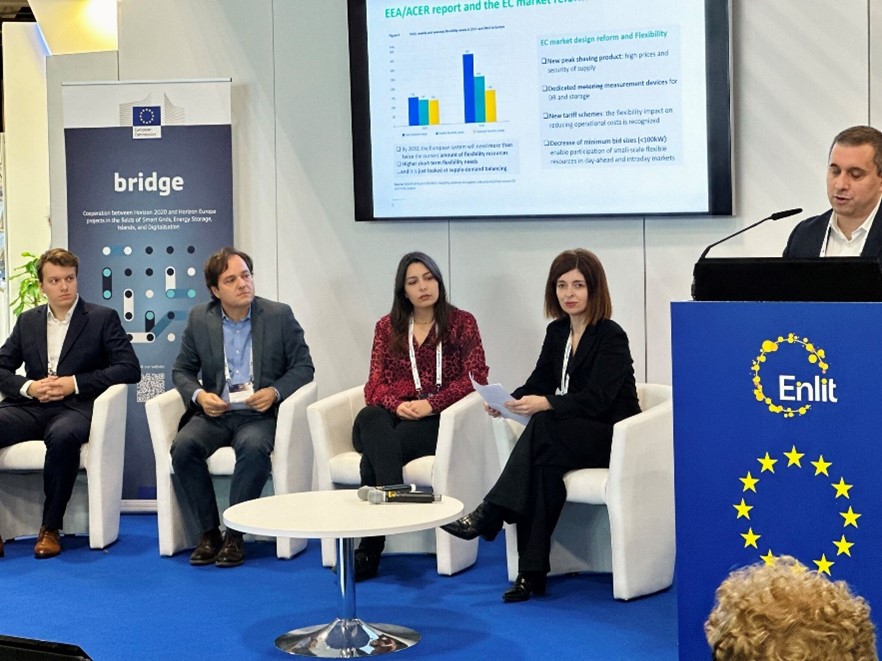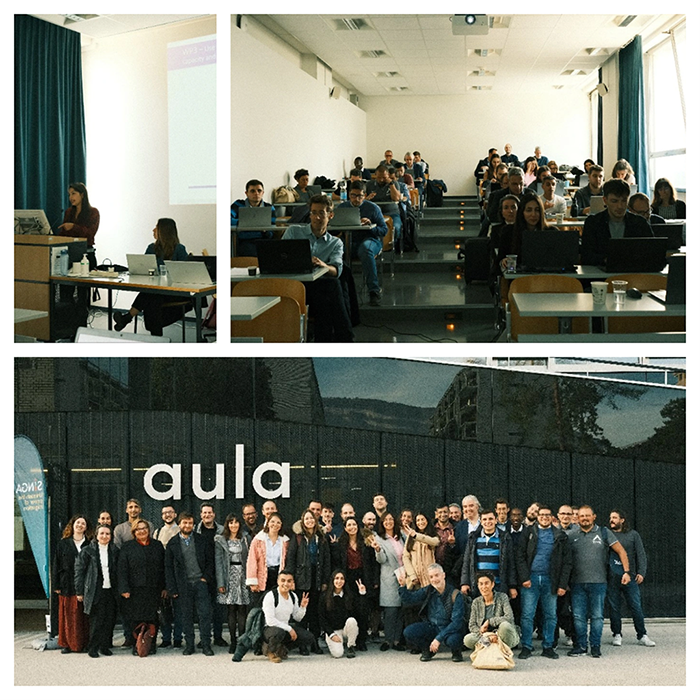UBITECH ENERGY participates in the project as the technical coordinator and the WP2 leader.
The official launch of the ODEON project took place in Valencia, Spain, on 9th and 10th of January 2023. ODEON’s mission is to revolutionise the Digital Energy transition by providing federated data and intelligence orchestration. Addressing EU energy challenges, our project integrates Smart IoT Platforms and decentralized intelligence to enhance resilience and sustainability.
In ODEON, UBITECH ENERY is leading the exploitation activities and is responsible for the Energy/Data Assets Landscaping activities. In that meeting, the actions to be performed within the task and the methodology that will be followed well presented as well as the next steps for the upcoming months.

The SINNOGENES project, for which UBITECH ENERGY handles technical coordination, aims to establish a comprehensive framework of methodologies, tools, and technologies (SINNO energy toolkit). This toolkit is designed to facilitate the transition to clean energy by offering innovative energy storage solutions and flexible power generation. It ensures system compatibility and compliance with distributed energy storage standards for participation in flexibility markets.
UBITECH ENERGY contributes to the project activities both as a technical partner via the leadership of two tasks,
namely T4.4: The EVELIXIA Autonomous District Decision Support Services and T4.6: The integrated B2G
and G2B Services Layer, as well as Data, Ethics and Security Manager of the project, leading also T8.4:
Data, Ethics, Security Management. In the framework of EVELIXIA, UBE develops Innovative technology
Solutions for Building-to-Grid Services (DSM Services Advisor tool), as well as for Grid-to-Building
Services (Grid Investment Planning Assistant tool, Multi-vector Network Manager tool, Smart Grid
Maintenance tool).
UBITECH ENERGY actively engaged in the fourth plenary meeting of DATA CELLAR, held on November 23rd and 24th, 2023, in Gijon, Spain. As
UBITECH ENERGY attended Enlit Europe that was held in Paris from November 28 to 30, representing the ENFLATE project. Within ENLIT, ENFLATE in collaboration with BeFlexible and STREAM projects held a session titled “Unlocking Flexibility Markets: Are Customers Ready to Embrace Innovation?” that attracted over 150 attendees sparking discussions on customer engagement.

The panel discussion was moderated by Zabala Innovation Europe and featured speakers with expertise in the energy sector:
- Katerina Drivakou (UBITECH ENERGY), ENFLATE Project Coordinator
- Fernando David Martin Utrilla (i-DE), BEFLEXIBLE Project Coordinator
- Jan Jeriha (University of Ljubljana), Stream Project Coordinator.
- Ricardo Bessa (INESC TEC), Keynote Speaker
The panel delved into critical topics surrounding flexibility markets, offering valuable insights into the energy sector’s future possibilities. Discussion points included barriers and motivations driving consumer engagement, platform interoperability, and evolving regulatory frameworks. The session emphasized a paradigm shift towards intelligent grid connectivity for consumers, recognizing the demand for incentives, education, feedback, and support in active participation.
Key takeaways from the keynote speaker included the challenge of long-term customer engagement in flexibility markets, the potential of a combination of monetary and non-monetary incentives to unlock flexibility, the need for increased consumer information and energy literacy, and the bottleneck of low voltage grids for decarbonization, requiring new planning and operational paradigms.
The main takeaways from the panel discussion were:
- Customer engagement is crucial for demand response services, however it requires well-designed incentives for consumers, as well as continuous feedback and support.
- Interoperability between platforms, systems, and services is fundamental for fast and cost-effective flexibility exploitation.
- There is a growing challenge of accommodating new types of services and business models for prosumers and grid operators to facilitate Distributed Energy Resources (DER) integration in the energy system.
- From a regulatory perspective, integrating the flexibility services to the current energy system is a quite challenging process especially when it comes to the implementation of cost-reflective network charges, the establishment of flexible connection agreements and the market-based procurement of flexibility.
You can find the session’s presentation here
The GINNGER consortium marked the initiation of its project activities during the official project kick-off meeting held on November 8th and 9th, 2023, in Zaragoza, Spain. This significant event convened over 40 representatives from 20 project partners across various European countries. During this inaugural gathering, the consortium formally launched their ambitious undertaking.
The primary focus of the first day revolved around mutual introductions and fostering a comprehensive understanding of all project-related facets, including descriptions. Specifically, partners engaged in in-depth discussions about the intricacies of each work package, aiming to achieve a thorough understanding of their individual roles and responsibilities within the project.
On the second day, the primary emphasis was placed on the project’s six different demonstration sites situated in Spain, Bulgaria, Switzerland, Italy, and France, with the aim of exploring their unique attributes and requirements.
UBITECH ENERGY plays a crucial role in GINNGER as the leader of Subtask 4.2.4, i.e., responsible for the development of the blockchain-based Flexibility Marketplace and its implementation in the field. In general, Task 4.2 deals with the Development of the digital solutions from the Energy Block (i.e., Forecasting Module, Energy Management Tool, EC Creation and Operation Tool and Flexibility Marketplace). Within this context, UBE will use the blockchain technology to develop this digital marketplace in a secure and transparent way and enable the consumers in the neighborhoods to exchange their renewable energy generated, their storage capacity and/or possibly provide ancillary services to the grid, following a demand response approach.
ENFLATE partners met for the second General Assembly in Geneva, Switzerland, on October 17th and 18th to discuss the progress of the project and exchange more ideas on different topics related to flexibility. The meeting was hosted by the University of Geneva and resulted in two days of fruitful discussions between experts of different fields.

UBITECH ENERGY, as the technical coordinator of the project, presented the progress on the definition of the ENFLATE data management platform architecture and the way forward. Also, UBITECH ENERGY presented the results of the analysis carried out regarding the regulatory frameworks that are in place in ENFLATE demonstration countries, the market designs adopted by other research projects and initiatives, as well as the business models that can unleash the flexibility potential of electromobility, heating resources/networks and households.
The ECOEMPOWER consortium inaugurated its project activities on September 19th and 20th, gathering in Trento, Italy, for the official project kick-off. This pivotal event brought together more than 20 representatives hailing from 10 project partners, spanning several European countries including Belgium, the Czech Republic, France, Germany, Greece, and Italy. In this initial meeting, the consortium solidified the formal commencement of their ambitious endeavor.
The primary focus of the first day centered on mutual introductions and building a shared understanding of all aspects of the project. Collaboratively, the partners began shaping the foundational elements of the project’s identity. Additionally, they delved into the intricacies of each work package, ensuring a comprehensive grasp of their respective roles and responsibilities.
On the following day, the consortium embarked on a field trip to visit energy communities, cooperatives, and renewable energy facilities in the region. This hands-on experience provided valuable insights into the operational aspects of these entities and offered a tangible connection to the communities that will be integral to the project’s success.
UBE’s main role in ECOEMPOWER is as the leader of WP2 and its three tasks. The WP2’s main objectives and activities revolve around providing technical support to the project’s energy communities. This support includes conducting local power system analysis, offering options for participating in energy markets, and aiding in decision-making regarding new energy assets and efficient resource scheduling. WP2 aims to simplify the technical complexities of energy systems and market participation for these communities by developing a user-friendly web platform tailored to their specific needs. This WP consists of several crucial tasks and will follow a 3-step approach including: (i) defining the platform requirements and energy communities’ use cases, (ii) developing the platform and the different tools comprising it (i.e., forecasting tool for energy generation and demand, energy system modeling and scheduling tool, cost-benefit analysis and decision-making tool, data storage, analytics, cybersecurity, and HMI for the energy communities) and (iii) conducting the validation of the platform and energy analyses for the ECOEMPOWER energy communities. This platform will assist communities in optimizing their energy resources, making informed decisions, and planning for a sustainable energy future while considering environmental impacts and market prospects.
